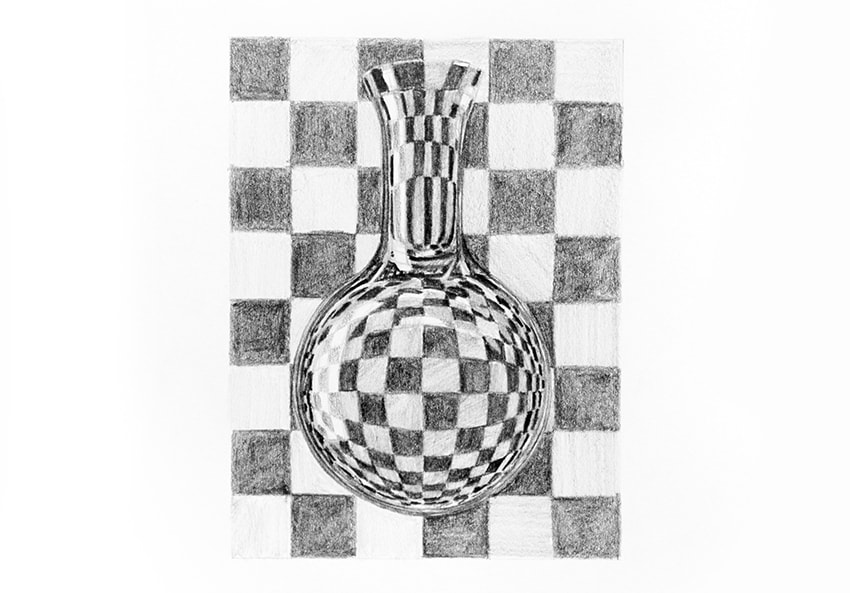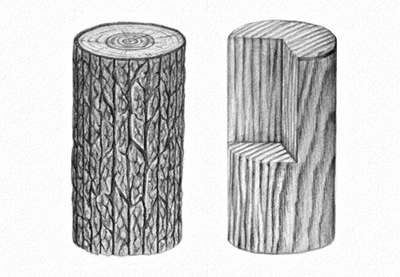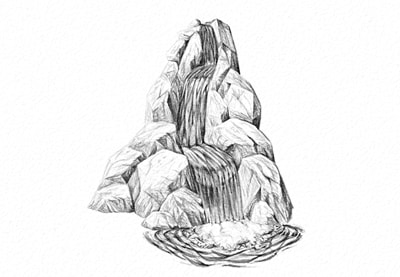
Transparent glass is incredibly hard to draw from imagination. That’s because we know it’s “invisible”, so what is there to draw? But the correct approach is to draw what we see, not what we know—and if glass can be seen, it can be drawn.
You can follow this tutorial in two ways. You can just copy my actions to create a beautiful, realistic drawing of glass, but you can also read the explanations carefully to learn how to render glass things in the future outside of this tutorial. The choice is yours!
What You Will Need
- HB pencil
- 5B pencil (or anything much softer than HB)
- Ruler
- Eraser
- Pencil sharpener
1. How to Draw Thick/Solid Glass
You can use this lesson to create a solid glass sphere or a glass stick.
Step 1
Draw a circle using the HB pencil. You can start with a cross to achieve a perfect shape. Draw the lines lightly—this is just a base. The lines are dark in this tutorial so that you could see them clearly, but you should barely see them in your drawing.

Step 2
Extend the vertical line and draw the sides of the bottleneck.

Step 3
Finish the shape of the “solid bottle” by adding a few perspective-defining ellipses.

Step 4
Take the ruler and draw a checkerboard background. Because we can see glass by how it influences its background, this will be very useful for us.

Step 5
A solid sphere of glass works like a convex lens. This means we need to enlarge the checkerboard fields within its outline. It can be easily done by turning the lines into ellipses. First, create a wide ellipse in the middle…

… then more ellipses around. Each one should be closer to the previous one, until you reach the main outline.

Step 6
Do the same with horizontal ellipses. Feel free to break the symmetry for a more interesting effect.

Step 7
Use the same rule in the bottleneck. This time draw lines, not ellipses, since a cross-section of a cylinder is a rectangle, not a circle.

Step 8
Cross the lines with vertical ones. You can achieve a more natural effect by breaking the symmetry again.

Step 9
Our “bottle” doesn’t have an opening—there’s a flat surface on top that’s visible through the glass. And since we see it through the glass, it must be distorted.

Step 10
We have a kind of double distortion here, so break the rhythm:

Step 11
Here’s a difficult place. The glass here is thick and it has an irregular shape. The same thing would happen on the bottom of a real bottle. You can skip this part if it’s too difficult, but it adds a really nice effect.


Step 12
Time for the must fun thing: reflections! If your glass is a part of a scene, you must adjust the reflections to the lighting in the scene. If not, feel free to create simply any reflections that look good.
In my case, I’ve created a rectangular light that’s reflected on the side…

… and then gets reflected (and enlarged!) inside the bottle on the other side.

Finally, I’ve added a set of rectangular lights over the bottle to create a lot of little reflections. Notice the reflection of the top on the bottom!

Step 13
You can relax now, because everything is well defined and we can just finish it step by step. Tilt your pencil and fill half of the fields on one side with gray (on the left if you’re right-handed and vice versa).

Step 14
Take the 5B pencil, tilt it, and fill the other fields. Don’t press too hard, but try to achieve a nice contrast.

Step 15
Now focus for a while to fill the fields within the glass outline. Do it field by field, trying to see them in the lines you’ve defined before. When you get within an area of reflection, press lighter.


Step 16
Now take the HB pencil again and fill the other fields. Keep the areas in light white.

Step 17
Do you remember that thick/irregular spot in the middle? Keep it dark, with a tiny, tiny checkerboard pattern hidden in it. If your glass had a tint of color, this is where it would be visible the most.

Step 18
Now do the same with the other half.


Step 19
Finally, you can take the eraser and subtly smudge it over the reflections. Feel free to fix them with pencils as well.

2. How to Draw Thin/Empty Glass
You can use this lesson to draw a drinking glass or an empty sphere.
Step 1
Start with the same bottle with a checkerboard background as before.

Step 2
Define the thickness of the glass by drawing the inside wall.

Step 3
This time it will be a little different. Draw the ellipses within the outer circle, but finish them abruptly in the inner circle.


All the ellipses should stay within the inner circle.

Step 4
Draw the lines in the bottleneck, again only “inside” the bottle.

Step 5
The edge of the bottle’s opening is visible through glass as well, so we need to use the same trick as before.

Step 6
This time the opening is open, so there’s only one layer of glass to see the background through.

Step 7
That difficult spot is even more difficult in an empty glass. Notice how it seems to bend to the inside. Also, don’t forget to draw the distortion within the wall—it’s so tight that’s it’s best to draw it with simple lines.

Step 8
Time for reflections!

Step 9
Now the most pleasant part. First, fill one half of the fields with a tilted HB pencil.

Step 10
Then fill the other half with a tilted 5B pencil.

Step 11
Fill the little fields inside the bottle. They should be really, really tiny near the wall. Keep them light inside the reflections.



Step 12
Draw the distortion within the wall with dark, thin lines. Keep contrasting white lines in between.

Step 13
Make that spot in the middle dark and thick.

Step 14
Take the HB pencil again and fill the remaining fields, keeping the reflections white.

Step 15
Repeat the process for the other side of the picture.


Step 16
You can use the eraser to make the reflections pop.

Beautiful!
As you can see, glass isn’t so difficult to draw once you know how it all works! If you liked this tutorial, don’t forget to check out more:
 NatureHow to Draw a Winter Landscape From ScratchMonika Zagrobelna
NatureHow to Draw a Winter Landscape From ScratchMonika Zagrobelna DrawingHow to Draw WoodMonika Zagrobelna
DrawingHow to Draw WoodMonika Zagrobelna NatureHow to Draw Water in NatureMonika Zagrobelna
NatureHow to Draw Water in NatureMonika Zagrobelna

{excerpt}
Read More